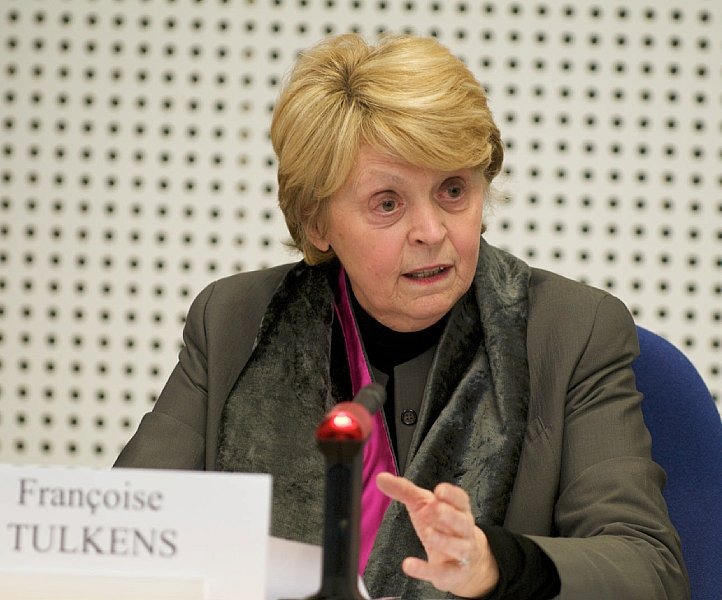Symposium 2013 Keynote Speaker: Françoise Tulkens

Delegates, invited guests, and listeners worldwide via live webcast of the opening session of the 20th Annual International Law and Religion Symposium were privileged to hear an excellent and stimulating keynote address by Judge Françoise Tulkens, who spoke to the topic Religion and Human Rights from her perspective as a member of the European Court of Human Rights.
Judge Tulkens was a member of the Court in respect of Belgium from 1998 until her retirement in 2012. She served as Section President from 2007, and from February 2011 she was one of two Court Vice Presidents, along with Sir Nicolas Bratza, under President of the Court Jean-Paul Costa. She brought to the Court “fine legal skills and great personal qualities. … passion, generosity, energy, sensitivity, charm, wisdom, sense of justice and unfaltering commitment to human rights. This exceptional combination enabled her to become a key player within the European Court of Human Rights.” [See Tribute by Marie-Bénédicte Dembour, below.]
Prior to joining the Court, Tulkens practiced at the Bar in Brussels from the time of receiving her doctorate in law and license in criminology in 1965 until 1968, when she was appointed Research Fellow with the Belgian National Fund for Scientific Research (Fonds National de la Recherche Scientifique). In 1976 she became Professor of Law at the Catholic University of Louvain, Louvain-la-Neuve, where she remained until her appointment to the Court. She has received honorary doctorates from the University of Ottawa, the University of Geneva, and the University of Limoges.
As a researcher, scholar, and professor, she has visited at Columbia and New York University law schools, the University of Montreal, the Max Plank Institute, Louisiana State University, the University of Paris, the University Montesquieu Bordeaux IV, and the University Robert Schuman of Strasbourg, among others. In 2001 she was UNESCO Chair for Human Rights and Democracy (Cotonou, Bénin).
Upon Judge Tulkens’ retirement from the Court in 2012, Professor Samantha Besson of the University of Fribourg noted,
“Throughout her career as a judge, Françoise Tulkens has always remained an academic at heart. Whether in her inspirational conferences and publications, on the one hand, or in her rigorous judgements and opinions, on the other, she has constantly encouraged and nourished what she regarded as a much needed dialogue, and at times ‘mutual check’ to borrow her own words, between judges and academics. …
“With respect to the ‘conflict of human rights’ issue, … Tulkens’ general take is exposed in the seminal piece she published on the topic with Olivier de Schutter (De Schutter, O. and Tulkens, F., ‘Rights in Conflict: The European Court of Human Rights as a Pragmatic Institution’, in Brems, E. (ed.), Conflicts between Fundamental Rights, Antwerp: Intersentia 2008, 169-216). That article provides one of the very few discussions of the question of conflict of ECHR rights that is both theoretically informed and practically focused.”
Another tribute, from Professor Marie-Bénédicte Dembour of the University of Sussex, focused on Tulkens as a “indefatigable defender of migrants’ human rights” and noted her sole dissenting opinion in the 2005 Grand Chamber judgment in Leyla Salin v. Turkey:
“[T]he Court endorsed the prohibition of the wearing of the Islamic headscarf by University students. The case is of direct relevance to migrants for, although it was brought by a national of the defendant state, it went to the core of what it means to respect the other. Judge Tulkens found herself in a minority of one in the Grand Chamber. She provided in her dissenting opinion a sensitive and penetrating analysis of the significance of Muslim practices, gender equality, and European attitudes towards Islam. The rounded and exceptional quality of her legal judgment, informed by sociological understanding and inspired by a profound sense of humanity, shines in this opinion where every word sounds just, and every issue is carefully assessed.
“But writing sole dissenting opinions, however distinguished, was never Françoise Tulkens’ goal. Although she has no problem speaking her mind, what she wanted most, it seems to me, was to influence the development of the law in the direction which appeared to her best to embody the human rights values in which she firmly believed. …”
Judge Tulkens has three children, Frédéric, Nicolas, and Alexis.